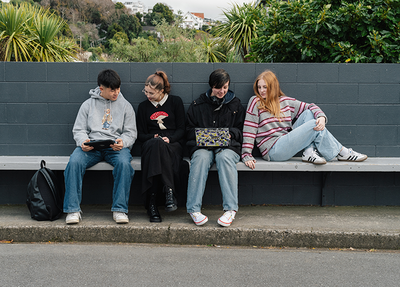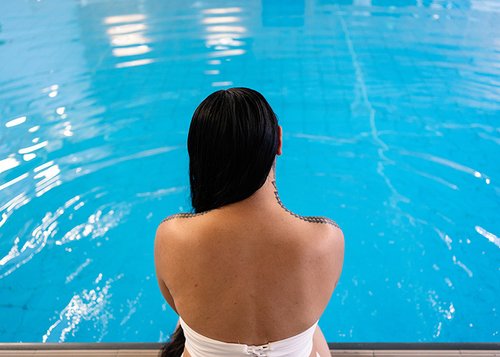Think before you nude – a new campaign
Rangatahi, Netsafe and the Classification Office Te Mana Whakaatu collaborate on a campaign around the risks of taking and sharing intimate images.
Sharing nudes is part of everyday life for many young people in Aotearoa, but not all consider how their image may be made public or shared in ways they didn’t intend after the moment.
Netsafe and the Classification Office Te Mana Whakaatu today launched Bare Facts, a nationwide campaign designed to encourage open conversations about the reality of online intimate images.
An important tool of Bare Facts is an animated video explaining what happens to intimate images and why consent is important.
“As media regulators we see a lot of the harms that come from intimate images and we also know that sharing images like this is a reality for our rangatahi,” said Chief Censor David Shanks.
“Following on from work we did researching young people and pornography we have created this campaign to help rangatahi have a better understanding of the issues around sharing nudes.
“Nudes can be seen as a standard expectation, as one young person told us – ‘Relationships have a sort of progression as they go along, and some people might think that sending nudes is a part of that’.”
The development and creation of Bare Facts was informed by the Classification Office’s Youth Advisory Panel and Netsafe’s Youth Action Squad. The campaign empowers young people to have positive kōrero – with peers, parents, teachers and whānau – about why nudes are sent, the need for consent and how to get help if things don’t pan out.
Netsafe’s research found almost four in ten teens know someone who has shared nude pictures or videos. Three in ten respondents were aware of another young person who has received content they did not request.
“Each week, our team supports people who have entrusted intimate content to someone, who has then gone on to share – and in some cases widely distribute – material in ways the sender could never have dreamed of,” Martin Cocker, Netsafe CEO, said.
“If this happens it’s important not to shame the person. The initial sharing is often done in a consenting way – and it’s the unauthorised on-sharing, or the threat to do so - that causes distress and harm.”
"We have working relationships with many online content hosts," Cocker said. “If someone discovers their image has been shared in a way they do not feel comfortable, Netsafe can explain the options available and work with them to try to remove the content."
Netsafe data shows that between May 2020 and April 2021, 66.6 percent of reports categorised as image-based sexual abuse were made by females. Reports from under 21-year-olds (of all genders) comprised 44.4 percent of reports.
Bare Facts advises people to trust their intuition, and if they are unsure, it’s best not to send or share anything. “Once a nude leaves your phone or device, it’s impossible to control what may happen to it and who may see it,” Mr Cocker said.
Sending and swapping nudes can be a fun and healthy part of dating, he said. “While some people don’t mind receiving an unexpected naked image, for some, this can be uncomfortable – and it can be a form of harassment.”
The Harmful Digital Communications Act (HDCA) makes it a criminal offence to disclose sensitive personal facts about a person or break confidences. Hefty fines or jail terms can be applied to those who breach the law.
The New Zealand Parliament is currently considering the HDCA (Unauthorised Posting of Intimate Visual Recording) Amendment Bill, which would make it an offence for a person to post a digital communication comprising intimate visual recordings of another person. The Bill is before the Justice Committee.
Additional info
Questions?
Email us: media@classificationoffice.govt.nz
About the Classification Office
The Classification Office is an independent Crown entity which classifies films and other content and has a key role providing information about classification work. It conducts research and produces evidence-based resources to promote media literacy and enable New Zealanders to make informed choices about content they consume.
About Netsafe
Netsafe is an independent non-profit organisation with an unrelenting focus on online safety. We keep people safe online by providing free support, advice, and education. Netsafe operates a confidential and non-judgmental helpline for anyone in New Zealand.
Visit netsafe.org.nz for valuable resources or call 0508 638 723 seven days a week for help with an online incident.
Harmful Digital Communications Act
The Harmful Digital Communications Act (HDCA) was passed in 2015 to help people dealing with serious or repeated harmful digital communications including image based sexual abuse. It lays out 10 communication principles that guide how to communicate online.
The Act covers any harmful digital communications (like text, emails, or social media content), including racist, sexist and religiously intolerant comments – plus those about disabilities or sexual orientation.
The 10 Communication Principles mean a digital communication should not:
- disclose sensitive personal facts about an individual
- be threatening, intimidating, or menacing
- be grossly offensive to a reasonable person in the position of the affected individual
- be indecent or obscene
- be used to harass an individual
- make a false allegation
- contain a matter that is published in breach of confidence
- incite or encourage anyone to send a message to an individual to cause harm to the
- individual
- incite or encourage an individual to commit suicide
- denigrate an individual because of colour, race, ethnic or national origins, religion,
- gender, sexual orientation, or disability.
Subscribe to our news
Stay up to date with news from the Classification Office.


